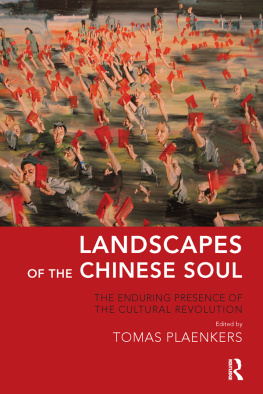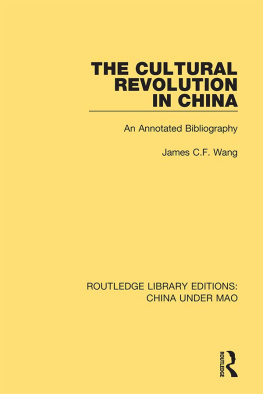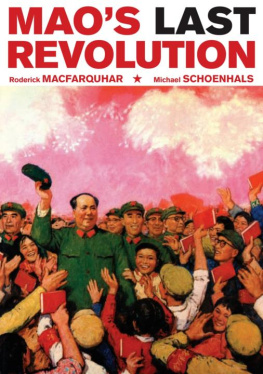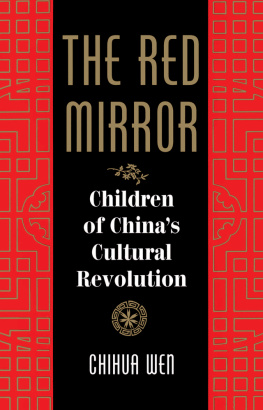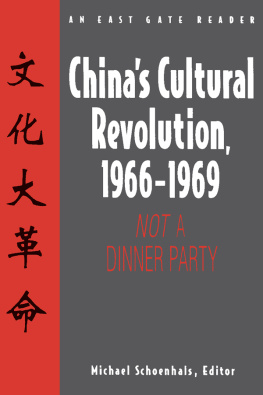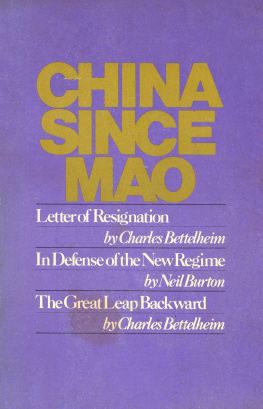LANDSCAPES OF THE
CHINESE SOUL
LANDSCAPES OF THE
CHINESE SOUL
The Enduring Presence of
the Cultural Revolution
Edited by
Tomas Plnkers

First published in 2010 in German with the title Chinesische Seelenlandschaften.
Die Gegenwart der Kulturrevolution.
2010 Vandenhoeck & Ruprecht GmbH & Co. KG,
Gttingen
First published 2014 by
Karnac Books Ltd.
Published 2018 by Routledge
2 Park Square, Milton Park, Abingdon, Oxon OX14 4RN
711 Third Avenue, New York, NY 10017, USA
Routledge is an imprint of the Taylor & Francis Group, an informa business
Copyright 2014 to Tomas Plnkers for the edited collection, and to the individual authors for their contributions.
The rights of the contributors to be identified as the authors of this work have been asserted in accordance with 77 and 78 of the Copyright Design and Patents Act 1988.
All rights reserved. No part of this book may be reprinted or reproduced or utilised in any form or by any electronic, mechanical, or other means, now known or hereafter invented, including photocopying and recording, or in any information storage or retrieval system, without permission in writing from the publishers.
Notice:
Product or corporate names may be trademarks or registered trademarks, and are used only for identification and explanation without intent to infringe.
British Library Cataloguing in Publication Data
A C.I.P. for this book is available from the British Library
ISBN 9781780490939 (pbk)
Translated by John Hart
Cover artwork by Cheng Yun Wang, 2008
The translation of this work was funded by Geisteswissenschaften International Translation Funding for Humanities and Social Sciences from Germany, a joint initiative of the Fritz Thyssen Foundation, the German Federal Foreign Office, the collecting society VG WORT and the Brsenverein des Deutschen Buchhandels (German Publishers & Booksellers Association).
Edited, designed and produced by The Studio Publishing Services Ltd
www.publishingservicesuk.co.uk
e-mail:
CONTENTS
by David E. Scharff
Tomas Plnkers
CHAPTER ONE
Negotiating the past: narratives of the Cultural Revolution in party history, literature, popular media, and interviews
Natascha Gentz
CHAPTER TWO
The Great Proletarian Cultural Revolution (19661976) as an experience of contingency
Liying Wang
CHAPTER THREE
Red terror: the experience of violence during the Cultural Revolution
Rolf Haubl
CHAPTER FOUR
The Cultural Revolution in the mirror of the soul: a research project of the Sigmund Freud Institute
Tomas Plnkers
CHAPTER FIVE
Psychic trauma between the poles of the individual and society in China
Tomas Plnkers
CHAPTER SIX
The Chinese Cultural Revolution: a traumatic experience and its intergenerational transmission
Friedrich Markert
APPENDIX 2:
Resolution on Certain Questions in the History of our Party since the Founding of the Peoples Republic of China
We are grateful to the Foundation for Psychosomatic Disorders in Stuttgart, Germany, for its support of the research on the psychic con sequences of the Chinese Cultural Revolution that is the focus of this book. See the contribution of T. Plnkers, The Cultural Revolution in the mirror of the soul (pp. 83120).
We thank Cheng Yun Wang for the cover artwork, Sunrise (2008). Cheng Yun Wang, born 1959, is Professor at the Sichuan Music and Art Academy in Chengdu, China. He says,
The Cultural Revolution was going on throughout my childhood. It is the first thing I remember. Neither then nor now have I been able to understand this event or to explain it in philosophical terms. Sunrise is my attempt, through painting, to bring these childhood experiences to some kind of closure.
We also thank Contact Press Images (Paris) for allowing us to print pictures from Li Zhenshengs book Red Colour News Soldier (Phaidon Press, 2003). Furthermore we thank the Brsenverein des Deutschen Buchhandels for the financial support for the translation of the German original.
Natascha Gentz, PhD, is a sinologist and Professor of Chinese Studies, Dean International (China), Head of Asian Studies, Director of the Confucius Institute for Scotland at the University of Edinburgh, and Director of the Scottish Centre for Chinese Studies.
Rolf Haubl, PhD, is Professor of Sociology and Psycho analytic Social-Psychology at the University of Frankfurt/Main, Director of the Sigmund Freud Institute (SFI), a group training analyst and group analytical supervisor, organisational adviser (DAGG, DGSV), and Leader of the Research Focus on Psychoanalysis and Society at SFI.
Friedrich Markert, MD, is a specialist in psychiatry, neurology, and psychosomatic medicine and has been in private practice in Frankfurt since 1981 as a psychiatrist and psychoanalyst (DPA, IPA), group analyst (SGAZ Zrich), supervisor and Balint group leader. Since 2008, he has taught at the Shanghai Mental Health Center in China, training Chinese psychiatrists and psychologists in analytic group therapy.
Tomas Plnkers, PhD, is a member of the Sigmund Freud Institute in Frankfurt (Research Institute for Psychoanalysis and its Application), and is in private practice. Since 2000, he has been teaching psychoanalytic psychotherapy and psychoanalysis in China, and is a Con sultant Member of the IPA China Committee. His main scientific work is in the fields of clinical and social psychoanalysis. He is editor and author of many clinical and social-psychological publications, including books on the psychological consequences of East German totalitarianism.
David E. Scharff, MD, is the Co-Founder, Board Chair, and Former Direc tor and Supervising Analyst of the International Psychotherapy Institute, Chevy Chase, Maryland. He is the Clinical Professor at George town University Medical School, and a teaching analyst at Washing ton Psychoanalytic Center. He serves as Chair of the IPAs Work Group on Family and Couple Psychoanalysis, and is Chair of the Continuous Training Program in Couple, Family and Child Therapy of the Beijing Mental Health Association. He is the author and editor of thirty books and numerous articles, including, with Jill Savege Scharff, The Interpersonal Unconscious (2011) and Psychoanalytic Couple Therapy (2014).
Liying Wang, PhD, is a post-doctoral student and teaching assistant at the Institute for Non-European Languages and Cultures at the University of Nuremberg-Erlangen. She was born in Shenyang in China. She has participated in the research project Forms of Biographical Processing of Social Upheavals as research associate at the Foundation for Psychosomatics in Stuttgart.
David E. Scharff
This volume, by members of the Sigmund Freud Institute in Frankfurt and co-operating sinologists and psychoanalysts, documents the research project on the trauma of the Cultural Revolution in China and its intergenerational effects. It describes direct examples of trauma inflicted during that period, and it also gives the larger cultural context in which we can begin to comprehend the extent and impact of national trauma in modern China. The scope of the book also allows us to view this trauma through the perspective of 2,500 years of Chinese thought, and in the light of Chinese social history and governmental policy in the past 100 years. Its wide ranging content encompasses much that a Western student of psychoanalysis, of history, and of comparative thought needs in order to see the magnitude of the impact of the Cultural Revolution on Chinese individuals and on China as a country, as we all witness the return of China as one of the most influential cultures on the world stage. It is incumbent on us to take on board the intellectual developments of Chinese history if we are going to try to understand issues of mental health and treatment in China. It might seem to the psychoanalyst and psychotherapist that such cultural history is not especially relevant to the core issues of dealing with patients, but the contributors to this book do not think so. Imagine if psychoanalysis as a field were to decide that the study of the Holocaust was irrelevant to our field! Not only would it be a loss concerning the capacity of analysis to contribute to understanding the most devastating events that happened in Europe and the West in the past 100 years, but we would be unable to help thousands of patients who were directly or indirectly affected by the Holocaust. In addition, we would be denied those lessons that continue to apply to understanding and treating widespread trauma in our own time.

